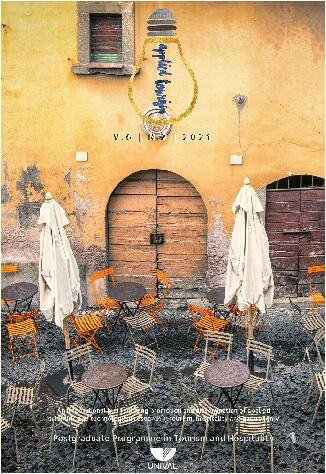TOURISM, BASIC EDUCATION AND UNIVERSITY EXTENSION: A REPORT OF EXPERIENCE
DOI:
https://doi.org/10.14210/at.v6n2.p49-54Keywords:
Tourism, Extension, Basic Education, UFS.Abstract
Extension actions and projects can help maintain the relationship between the university and society, in order to meet the needs of the external community, maintaining connections with social demands, public policies and diverse social movements in order to reduce inequalities and promote social inclusion. The project UFS de Braços Abertos, which is linked to the course in Tourism, is one such project. It offers guided tours for visiting elementary and high school students to the university campus, in order to present the university, its courses, the services offered, and the research and extension projects developed, creating a closer relationship between higher education and basic education. Based on this premise, this work analyzes the relationship between tourism, university extension and basic education, through the guided tours conducted as part of the UFS de Braços Abertos project, focusing on specifically on the participation of the Executive Secretarial course. In terms of approach to the problem, this study used qualitative research. The methodological procedures adopted were bibliographic research, and interviews with the head of the Executive Secretarial department and students of the course. We also sought to identify the perceptions of lecturers of the Executive Secretarial course in relation to the importance of the project, and the visits by school students to the University. The project helps to demystify the widely held perception, among students in basic education, that attending a federal university is a distant reality. The school students often arrive with this view, but after the visit, they are able to understand more how this universe works, and can dream of applying for place at university when they leave school. The report of experience presented clearly shows the important role of the UFS de Braços Abertos project, not only for the school students who may enter the university in the future, but also for students of the Tourism and Executive Secretarial courses, as it gives them an opportunity to promote and publicize the courses, stimulating the curiosity of the visiting students and showing them more about the respective professions, which can help them make future career choices.
References
BONI, V; QUARESMA, S. J. Aprendendo a entrevistar: como fazer entrevista em ciências sociais. Em Tese, Florianópolis, v.2, p. 71, 2005.
DUARTE, J. Métodos e técnicas de pesquisa em comunicação. São Paulo: Atlas 1, 2005.
GALVÃO, M. C. B. Fundamentos de epidemiologia. 2. ed. 2010.
__________. O levantamento bibliográfico e a pesquisa científica. In: FRANCO. L. J.; PASSOS, A. D. C. (Orgs). Fundamentos de epidemiologia. 2 ed. São Paulo: Manole, 2011.
GIL, A. Como classificar as pesquisas? In: Como elaborar projetos de pesquisa. São Paulo: Atlas, 2002.
LEWGOY, A. M. B; SIVEIRA, E. M. C. A entrevistas nos processos de trabalho do assistente social. Porto Alegre, 2007.
OLIVEIRA, N. F. C; MELO, S. D. G. Extensão universitária e educação básica. 36ª Reunião Nacional da ANPEd – 29 de setembro a 02 de outubro de 2013, Goiânia-GO.
PATIAS, N. D; HOHENDORFF, J. V. Critérios de qualidade para artigos de pesquisa qualitativa. Psicologia em Estudo. vol. 24, Maringá, 2019.
PEREIRA, E. M. de A. A universidade da modernidade nos tempos atuais. Avaliação, Campinas; Sorocaba, SP, v.14, n.1, p.29-52, mar.2009.
PROGRAD. Catálogo cursos de graduação. 3. ed. São Cristóvão: Editora UFS, 2019.
SOUZA, R. S; DIESEL, V. Metodologia da pesquisa. Brasil, 2008.
Downloads
Published
Issue
Section
License
In this term of responsibility I (we) certify the participation in the drafting of the attached article, thereby making public my (our) responsibility for its content. I (we) declare not omitting any connections or financing agreements between I (we) and entities and / or institutions that may have an interest in the publication of this article. I (we) certify that the article is original and that the work, in whole or in part, or any other work with content substantially similar to my (our) authorship, in any other format (printed or electronic), was not sent to another journal and will not be sent while is being considered by the Applied Tourism. In this consent form, the authors give permission to the journal, in the case of approval by the Editorial Board, for the publication of the attached article in hard copy and/or electronic form, in a regular edition of the journal.










